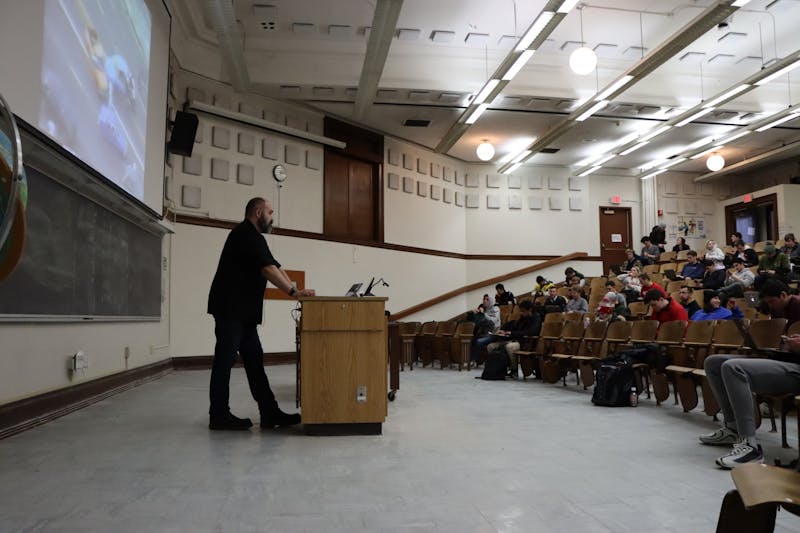
Professor Alexander Shashko lectures his Afro-Am 154 class on Tuesday and Thursdays in Birge Hall.
Image By: Kalli Anderson
Professor Alexander Shashko lectures his Afro-Am 154 class on Tuesday and Thursdays in Birge Hall.
Image By: Kalli AndersonWhen I was a freshman, I never expected to like a class so quickly. I had dread, of course, that college was going to be how everyone said it was: challenging, stressful and occasionally boring. When I took Afro-American 154, the History of Hip-Hop, my faith in my four years had been restored. Maybe all of college could be so awesome.
Whether it was the music videos displayed on the projector before class or the whole lecture dedicated to Beyoncé and Jay-Z, the relevance of music in the classroom today shone through.
As times change, so does curriculum. Twenty-first century educators are constantly met with the challenge of adapting to new norms while preserving history. At UW-Madison, this challenge is hardly new.
Current lecturer and UW alumni Alexander Shashko has been teaching in the Afro-American American Department for nearly 15 years. In that time, Shashko has also scored a seat on the voting board for the Rock & Roll Hall of Fame.
Currently, Shashko teaches three courses at UW: Afro-American 272: Race and American Politics from the New Deal to the New Right, Afro-American 154: Hip-Hop And Contemporary American Society as well as Afro-American 156: Black Music and American Cultural History.
With a background in political history, Shashko focuses on creating a connection between what happened one hundred years ago to what people hear on the radio today.
“When you’re trained as a historian, part of your goal is to get people to connect the past to the present,” Shashko said.
But, it’s not always that easy. When discussing the current, diverse music landscape and the inevitability of changing popularities, he admits it can be hard to figure out what he wants to teach.
“I have the same amount of time every semester,” Shashko said. “Every few years I have to try and rethink how the class is going to be restructured.”
As important as DJ Kool Herc and Afrika Bambaataa are to the foundations of hip-hop, getting to teach about current artists like Jay-Z and Kendrick Lamar proves to be a rewarding experience for students.
“The payoff, as students, is to be able to hear what you hear now and understand its resonance and its connections to the music of previous generations,” he explained.
As an Afro-Am 154 alum, I can admit that being able to listen to Drake’s “Nice For What,” intro and picking up on the fact that he’s actually sampling Ms. Lauryn Hill’s “Ex Factor,” was sort of a surreal experience and one I owe to my time in the class.
On top of the generational gap that Shashko’s classes might bridge, there’s something to be said about learning where our current music comes from.
“Music is one of the ways you potentially define your identity. Who you are, what kind of music you like, the people around you, what the music says. It’s a way of navigating the world when you’re young and trying to figure it out,” Shashko said.
The role music has played in history is one that has contributed to its great significance. “Learning about the world through music and through songs and through lyrics is something we have had in human society longer than the written word,” he mentioned.
Shashko also talks about how the history of hip-hop is one that cannot ignore its political surroundings. Shashko said the class gives him an opportunity to “recontextualize the story of race relations in a way that is political but not strictly speaking about politics.”
When asked about how today’s political climate plays a role in his classroom, Shashko admitted he tries to let history speak for itself. He said having students understand the ways music has allowed African Americans “to be engaged in the public sphere and to have a public voice” allows them to see “the role culture plays in our political dialogue in the present.”
Students should be able to realize a lot of what they’re learning about is not new, Shashko mentioned. He hopes to provide the context needed to better understand the bigger picture of the present.
While our climate today can be described as divisive, Shashko tries to have every student with every sort of political belief feel welcomed. He describes his classroom as a place where he wants students “to feel like they can learn something about themselves and how they perceive the world through the material they are learning.”
Teaching college kids about the ins-and-outs of hip-hop can lead to great rewards. Whether students take the class because they like music or have to fulfill a requirement, most leave at the end of the semester with a lot more musical knowledge than they had before.
One of the best parts of the gig, Shashko admits, is when students “go back and talk with their parents or talk with their friends about music, and they come back and want to pursue stuff they haven’t heard before.”
As someone who expanded her music taste tremendously after that fall in 2018, I can gladly say … guilty as charged.